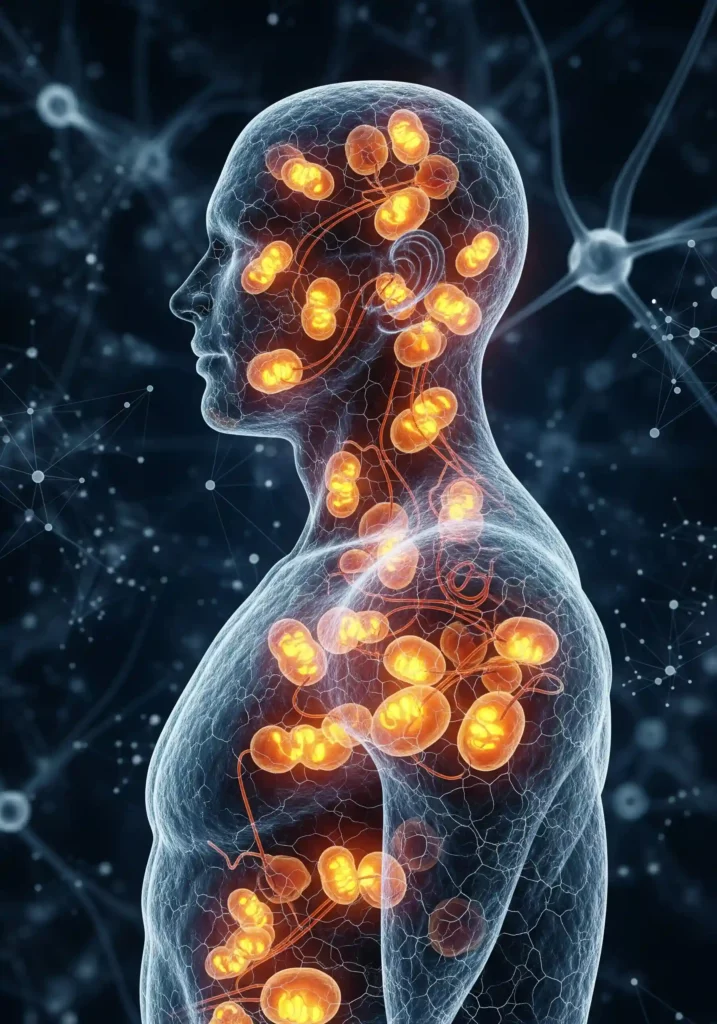

Metabolic flexibility is the body’s ability to switch between using carbohydrates and fats as primary energy sources depending on conditions (fasting, physical activity, sleep).
This mechanism determines how efficiently cells burn energy, maintain glucose levels, and prevent fat accumulation.
Research shows that low metabolic flexibility is associated with insulin resistance, chronic fatigue, weight gain, and the risk of type 2 diabetes.

Modern nutraceuticals offer a gentle, physiological approach to improve metabolic adaptation, increase endurance, and reduce inflammatory processes without interfering with hormonal regulation.
Key mechanisms of nutrient action
| Nutrient | Primary action | Mechanism | Additional effect |
|---|---|---|---|
| L-carnitine | Transport of fatty acids into mitochondria | Activation of β-oxidation of fats | Increased endurance, reduced fatigue |
| Berberine | Improves insulin sensitivity | Activation of AMPK, enhanced glucose utilization | Weight control, reduced triglyceride levels |
| Myo-inositol | Restores insulin signaling | Modulation of receptors and phosphoinositide cascade | Supports hormonal balance, reduces resistance |
| Taurine | Energy metabolism balance | Influences bile acid synthesis and oxidative stress | Mitochondrial protection, reduced inflammation |
| Green tea extract (EGCG) | Enhances fat oxidation | Stimulates AMPK, inhibits lipogenesis | Antioxidant and anti-inflammatory effects |
| Chromium (picolinate) | Regulates glucose levels | Enhances insulin effect | Reduces sugar cravings |

Practical application: from sedentary lifestyle to sports
| Target group | Issue | Optimal nutrients | Recommended combination |
|---|---|---|---|
| People with a sedentary lifestyle | Insulin resistance, weight gain | Berberine, myo-inositol, chromium | “Metabolic triad” for normalizing insulin sensitivity |
| Active office workers | Fatigue, low endurance | L-carnitine, taurine, EGCG | “Smart energy” formula |
| Athletes / sportspeople | Transition between fuel-burning modes | L-carnitine, berberine, magnesium | Supports mitochondrial metabolism |
| People practicing intermittent fasting | Hypoglycemia, energy fluctuations | Taurine, inositol, green tea | Stabilizes glucose levels |

Questions and answers
1. Can berberine and metformin be combined?
Yes, but under medical supervision — both activate AMPK, so glucose may drop below normal.
2. Should L-carnitine be taken before or after meals?
Before training or on an empty stomach for optimal absorption.
3. Is this strategy suitable for hypothyroidism?
Yes, but use caution with berberine — it may affect T3/T4 levels in some people.
4. Do nutrients affect ketosis?
Yes, L-carnitine and EGCG can ease the transition into ketosis and reduce “keto flu” symptoms.
5. Which nutraceuticals are suitable for preventing metabolic syndrome?
Berberine, inositol, omega-3, chromium, coenzyme Q10.
Conclusions
Maintaining metabolic flexibility is a long-term health strategy. Nutraceuticals do not replace physical activity and balanced nutrition, but help the body optimally adapt to changing energy demands, reduce the risk of metabolic disorders, and promote active longevity.
References
-
Polyzos, S. A. et al. Nutrients, 2024 — “Berberine in metabolic flexibility and insulin sensitivity.”
-
Wu, T. et al. Frontiers in Nutrition, 2023 — “Taurine as a metabolic modulator.”
-
Dieli-Conwright C. M., Metabolism, 2024 — “L-carnitine supplementation and mitochondrial adaptation.”
-
Higgins J. P., Nutrients, 2025 — “Green tea catechins and lipid oxidation.”
-
Chen G., Nutrients, 2023 — “Myo-inositol and glucose metabolism.”



